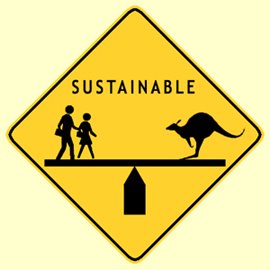
This is part summary of the last two posts and part new thought:
Eric T. Freyfogle has reason to distrust the word “Sustainable”. Definitions abound and vary widely, based mostly on the question of what is being sustained, who is ostensibly doing the sustaining and what the sustainer’s awareness encompasses. In this sense, though, sustainability is certainly no less problematic than a slew of other popular terms -- “local”, “homemade”, “all-natural”, “green”, “real” -- not to forget “Art”, “Democracy”, “Liberty”, “Freedom” and all the rest. We can be sure that any word which means something important and good will quickly come to also mean just about anything. With that in mind, here is an offer at a definition, and a method to determine the authentic from the invented.
Most definitions start with the one created by Our Common Future, a report issued in 1987 by the U. N. World Commission on Environment and Development:
"Sustainable development is development that meets the needs of the present without compromising the ability of future generations to meet their own needs."
This definition, like many, focuses on human needs, one reason why Freyfogle (sidebar) finds it unfit for the conservation movement.
Permaculture adds a systems-based definition:
"Self organising systems (such as those found in nature and society) all collect net energy from their surrounding environment. As well as nourishing their constitute parts, sustainable systems maintain and renew themselves over time without exponential growth, major collapse or massive internal restructuring." (from David Holmgren, a presentation to the “Students of Sustainability” conference at Flinders University, Adelaide, July 2003)
It all is pretty straightforward, so far - essentially sustainability is a test with three questions. Provide for human needs, climbing the heights of Maslow’s hierarchy pyramid, while also providing for the complex needs of the natural world, and do it for as long as possible.
The major confusion about the definition of the term is inherent – a population of six billion people on this planet is not sustainable, not in any way that is meaningful for either the natural world or the people living in it. Because of this confusion, philosophies of sustainable living usually start at one end or the other – providing first for humans as carefully as possible while maintaining as best as possible the rest of the world (such as organic farming), or working on ecosystem repair and management while trying to create a living for humans at the same time (such as edible forest gardening or Wes Jackson’s work at the Land Institute).
The term “sustainability” actually only occurs on those brief occasions where those two poles meet. They often can only at the smaller scales of home, farm, neighborhood and community. These scales are where the definition is useful, but only if there are not hidden or ignored inputs from outside the community, as often exemplified by the overwhelming use of the word "sustainable" for products and processes that clearly depend on the availability of (cheap) fossil fuels.
So to reclaim sustainability, we must simply ask the three big questions about any product or process (though I highly doubt there is such as a thing as a “sustainable product”):
- Does it provide for human needs (shelter, food, love, esteem, etc.) without compromising other humans or the natural world?
- Does it provide for the needs of the natural world (biodiversity, self-renewing fertility, clean air, water and soil) without compromising timate human needs or the natural world in some other place?
- Can it do so consistently over time – over many lifetimes or geologic time?

No comments:
Post a Comment